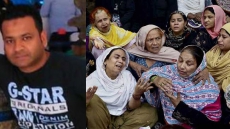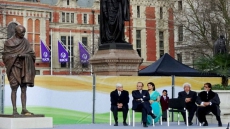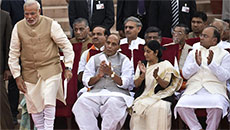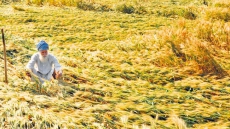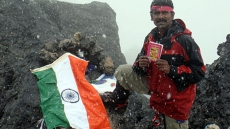The death of Kannada rationalist and literary scholar M.M. Kalburgi has sparked protests among people of all spheres in Karnataka. Many political leaders have drawn parallels between his death and those of rationalists Narendra Dabholkar and Govind Pansare.
According to those who were closely associated with Kalburgi, the killing represents a worrying trend of silencing people for holding contrarian views.
The former vice chancellor of Hampi University, Kalburgi, was shot dead by unidentified assailants at his home in Dharwad on August 30. Kalburgi was known for his extensive research on the 12th century old Vachanas, the literary work of Basava, the founder of Lingayatism.
According to activist and writer based in coastal Karnataka, H.S. Anupama, the killing of Kalburgi could have been an act to silence his ideologies.
"In my opinion, it was a mind target, to silence the person. There are many people including Kalburgi who vehemently opposed the Sangh Parivar and its ideology -- although we cannot say his killing was the work of Sangh Parivar. There are many facets to this killing," Anupama told IANS in a telephonic interview.
"Any idea slightly challenging to those in power is not being tolerated today. Freedom of speech is a farce and nearly non-existent, with so many in the country being silenced for their ideas," she said.
Through his writings, Kalburgi had pointed out that Lingayats cannot be a part of the Hindu religion since the community according to Basava's scriptures does not believe in idol worship, temple construction or caste system, Anupama pointed out, adding that self-realization was a key aspect of the community.
Lingayats are a major community in the political sphere of the state, and their political leaders were in merger talks with the BJP of the state. Hence, Kalburgi's writings, in a way, posed threats to the Hindutva ideologues.
His book Marga 1 in 1989, where he had examined several Vachanas by Basava's second wife Neelambika, had triggered the Lingayat community to force him to withdraw some parts of his text. Other texts of his had the other Hindu groups raising their brows at his work.
Kalburgi had called the withdrawal an "intellectual suicide" to save his family members.
"His research work on the Lingayat community, the Vachanas and the Shaiva-Vaishnava clash had created ideological enemies to him within the community," Anupama said, adding that the man was like an 'ajatashatru', someone who knew no enemies in his everyday life.
Among rationalists, Kalburgi's killing was roundly condemned. "Killing a 77-year-old man for his ideologies is an act of cowardice. He had a scientific way of analysing many things. He may have been killed, but his ideas cannot be," said Narendra Nayak, president of the Federation of Rationalists' Association of India.
Kalburgi, who had written over 100 books, had also shown his support to the Anti-superstition Bill, which was proposed by the current chief minister Siddaramaiah in 2013. The bill, which planned to ban practices like black magic and witchcraft had received flak from the BJP and other Hindu groups.
As the former vice chancellor of Hampi University, Kalburgi was a rationalist, anti-superstitious and believed in hard work, said a professor of Hampi University, who had worked with Kalburgi.
"He was a very sincere man, as far as the financial transactions of the university were concerned. He had no other ambitions than academic ones and was a very popular role model for many teachers in Karnataka," said the professor, who wished to remain anonymous.
Allegations that his killing may be over property or family matters cannot be possible, the professor said, as he was never interested in anything but academic subjects.
The 77-year-old man had a simple way of living and dressing, and ate two jowar rotis and some boiled vegetables as his standard meal, the professor said.
He also recalled numerous hate emails, letters and hatred on social media that Kalburgi had to face over the past few years due to his research.
But for Shreeraj Gudi, a professor in Manipal, who has been in Dharwad for over three decades - the place where Kalburgi was shot dead - the city has never witnessed such terror act.
Dharwad, arguably, the literary capital of Karnataka, as Gudi said, "has always been the place for debate and discussions. It has strong Left and Right wing ideologues, but the place never curtailed anyone's ideas."
Dharwad, about 430 km from Bangalore located in the north, is unlike coastal Karnataka, where the Left and Right wings often indulge in violence, Gudi said over the phone.
The town is also known to have produced the highest number of Jnanpith awardees.
Talking about the Hindutva groups in the state, Gudi said "even Pramod Muthalik (chief of Rashtriya Hindu Sena) does not enjoy the same popularity as he does in coastal Karnataka.
For Ramakant Joshi, publisher of the Manohara Grantha Mala, the image of Kalburgi's at 9.30 a.m. in the local hospital of Dharwad, where he was lying with two bullets through his head, stands still in his memory. Joshi, said Kalburgi was a workaholic who dedicated over 18 hours of his day to his writing. He had published 'Kevur Vasudevacharya Samagra' a book edited by Kalburgi, through Manohara Grantha Mala.
H.V.Kakhandiki, the core-secretary of the Dharwad Sahitya Sambhrama, which worked on the lines of the Jaipur Literature Festival, had worked very closely with Kalburgi, who was honorary president of the fest along with playwright Girish Karnad.
Kakhandiki and Joshi recalled the numerous plans that Kalburgi had laid ahead for his books and the fest, calling his death an "extremely unfortunate" event.

